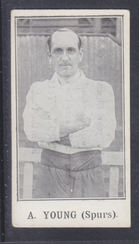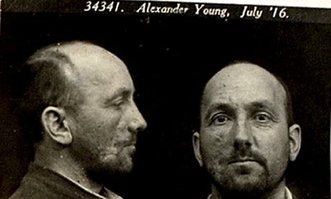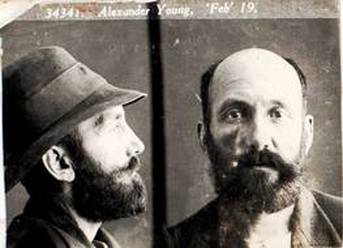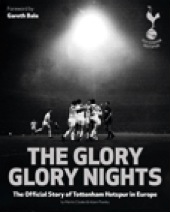 We signed Alex Young from Everton in June 1911, a move that caused outrage amongst Everton fans at the time but as we will see they had a good motive to sell him. Alex would only stay with Spurs for a short while but earns a place in our history as being our only player that has been convicted of murder, that of his brother. The story of Alex Young is another where Tottenham may not play the lead role but it’s an interesting tale from our past and I think worthy of your attention. If your thinking due to his short stay the title the Tottenham Murderer is a stretch, all I will say is when the Guardian ran a story on him they talked about his ‘deadly shooting ability'. Alex, sometimes known as Sandy, had played for St Mirren and Falkirk before joining Everton. He is second in their all-time list of goal scorers with 113. Although regular readers will not be surprised that some sources give varying figures. He scored the only goal in the 1906 FA Cup Final in a game that the Guardian report informs us "for half an hour and more the play was of the poorest description" and that Everton won "not so much because they played brilliantly as because Newcastle were so woefully weak". The Times account tends to agree "the only satisfaction about the match was that on the day the worse side lost". The following season Alex was the League’s top scorer. The Liverpool Echo said of him, "one of the most fascinating players that ever toed a ball." He had also won two caps for Scotland. In the light of later events there is an interesting comment from that clubs programme in 1904 ‘he enters into the spirit of every game, takes his hard knocks in the true stoical fashion, and comes up with the same pleasant smile and good-humoured intent.’ Before the 1906 Cup Final the Liverpool Echo had described him as "a variable sort of man who plays one good game in three on average", and "determination makes up for a lack of skill at times". By the time he was sold in 1911 opinion had changed “I have been a regular since the 1880’s and I unhesitatingly affirm that Sandy Young is the greatest forward that has ever played under the club's colours. Young has been and still is the club's greatest asset."  Image from the Public Records Office, Victoria. Taken at the time of his arrest. Below, Upon release. The paper describes the events when the transfer was announced. “A vast number of supporters will refrain from visiting Goodison Park next season if their favourite is missing from the home ranks," and "I myself (22 years a supporter) and many friends, have expressed the determination to withdraw our support if Sandy is not re-signed." There were signs that concerns had already been raised about his state of mind, at a meeting of the clubs shareholders that year there was much opposition to his sale to Spurs and the Everton Chairman Dr James Baxter, told the meeting "there were many things that came to the knowledge of the directors that were quite unknown to the shareholders". Later in January 1916 the minutes of the Everton Directors meeting reveals ‘having discussed Young's recent arrest, they resolved to send a cable "intimating that we could testify to Young's mental unsoundness". They later wrote to the mayor of Tongala, saying that they "can and desire to submit medical and other testimony to prove the fact that Young is and has been mentally unsound". As a result of their intervention, the charge against Sandy Young would be downgraded from murder to manslaughter. In short Everton were delighted when Spurs came in to buy him.  He made his Tottenham debut back at Everton on the opening day of the season and scored in a 2-2 draw. The Liverpool Echo wrote the fans ‘cheered him to the rafters’ and "Of all the receptions I have ever heard that day's volume led the lot." Young then scored twice in a home win over Sheffield Wednesday. He then failed to score in his next three games, two defeats and a draw before being dropped. He was so angry that he immediately demanded a transfer and we moved him on to Manchester City in the November. He later played for South Liverpool. The speed that we were willingly to discard him, after three goals in five games, is possibly, a sign that Spurs had concerns over his state of mind. In 1914 he moved to Australia, to a small town called Tongala which is about 140 miles north of Melbourne. He had previously purchased a small farm there in 1911 and his brother John, had been managing the farm. His departure from England was recorded in The Liverpool Echo “He was known for his intricate yet easily-performed dribbling, his dribbling was fashioned after the old school of dribbling, and the present age would be all the better for a little genius on the part of the forwards." Later in 1926 the Daily Mirror declared him "probably the greatest football artist in the mud we have had or are likely to have".
Things did not go well in the new country and the brothers would often be found arguing and using sticks and shovels on each other. Alex’s brother John had borrowed money from Alex on a number of occasions and failed to return it. On 30th November 1915 Alex was heard threatening to seize control of the farm. When John said "What about these cows, half of them belong to me," Alex replied "I don't think so, my cheque paid for them." As the friend left, Alex told him: "I cannot stop here, I am afraid John will murder me." Separately, John said: "Don't go away yet, I am afraid Alex will come out and shoot me." The following morning, John was in the milking shed, Alex shot him. It took most of the day for John to die. This enabled him to tell police "I was milking a cow when Alexander came up and said, 'I am going to shoot you.' I replied, 'Put the gun away. You are only trying to frighten me.' Alexander, though fired at me." Alex initially described a similar chain of events but later insisted that he had fired only after John had chased him for 40 yards across the farmyard wielding a shovel. "I went to the cow-shed, where I asked him about my money," he said in court, "John got up and rushed at me with a shovel. I ran away, and he followed. I stopped and said, 'Stand, or I'll shoot.' He made a rush and said, 'Come on, fire.' I fired, and he fell. I took up the shovel and went to my house and shot myself in the head. I do not remember anything after that." The wound was just a superficial wound to his face. The local newspaper, the Riverine Herald, described events as "a tragedy unequalled in the history of the district that rudely disturbed the rural peace and quietude of life in the Tongala settlement". After his arrest a description of his approach to the game differs from the one written in earlier times. The Sunday paper Lloyds weekly said that Young was "pugnacious by temperament" and "never quite happy unless he was allowed to have his own way". "This, no doubt, was the reason why he so often appeared to be playing with a grievance," The Liverpool press also identified some interesting traits, the Echo saying that he had been a "very somber man" who was "very highly strung" and "had peculiar habits". "He would live alone, as far as possible, and many a time when out training he slinked off to some long walk, and no one would get a word out of him. A curious temperament was Sandy's and there were periods (when he stroked the single lock of hair that adorned his forehead) which suggested that he suffered severe pains in the head." At his trial the jury returned a guilty verdict in under an hour. He was sentenced to three years in prison and much of this was spent in the Ararat Lunatic Asylum. Such was his finances that he appealed to Everton and the people of Liverpool for help in paying his legal costs and sent another appeal upon his release in 1919. The story here becomes confused as there are press reports he was hanged for sheep stealing. These are clearly incorrect as in May 1920 he returned to England. It’s not clear what happened to him over the next 39 years, he did appeal for help to Everton several times. In September 1959 he died aged 79 in a Scottish mental institution, the death certificate states his profession as professional footballer. He was buried in an unmarked grave. When he was sold to Spurs in 1911 as part of the attempt to appease supporters their directors stated that "Everton have never treated their players like oranges" and "at the proper time his services would not be forgotten". In 2014 the supporters club launched a project to erect a memorial to Alex and arrange a tombstone for the grave. COYS Keith Harrison. t- Keith 16024542 f- peter shearman (old non de plume) View Full Bio
0 Comments
Leave a Reply. |
Features
Flying Down to Rio History of T.H.F.C. Tribute to Bill Nicholson Talking Tottenham Early Legends The Road to Turin International Connections Hotspur Towers Most Read Articles
The 100 Year War Interview with Marina Sirtis A Long Dark Shadow By Royal Appointment School Report: An Insight into the Younger Eric Dier Dear Jimmy All Change At Spurs Hotspur Towers History Of THFC: Part 1 Passage to India: Rohan Rickets Thanks For The Memories Our Tommy Carroll The AVB Files: Part1 The Lilywhites You The Jury The Hand Of Hugo Connection - Argentina Creating a Reputation One Hotspur Archives
August 2018
Categories
All
|
 RSS Feed
RSS Feed

